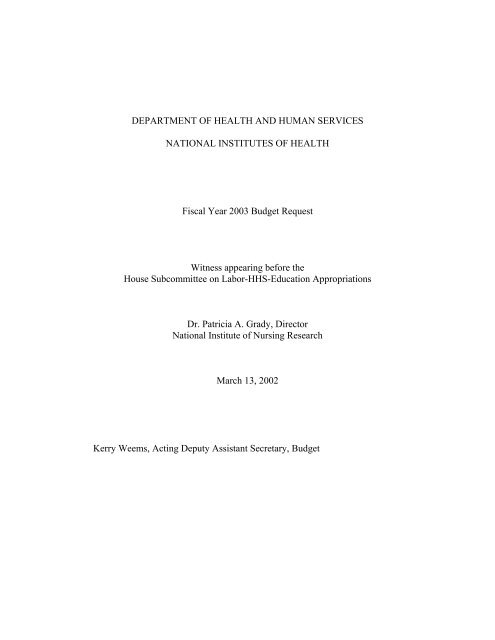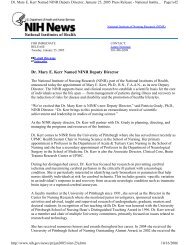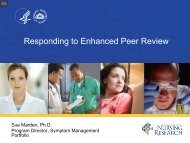PDF version - National Institute of Nursing Research - National ...
PDF version - National Institute of Nursing Research - National ...
PDF version - National Institute of Nursing Research - National ...
You also want an ePaper? Increase the reach of your titles
YUMPU automatically turns print PDFs into web optimized ePapers that Google loves.
DEPARTMENT OF HEALTH AND HUMAN SERVICESStatement byDr. Patricia A. GradyDirector, <strong>National</strong> <strong>Institute</strong> <strong>of</strong> <strong>Nursing</strong> <strong>Research</strong>on theFiscal Year 2003 President’s Budget Requestfor the <strong>National</strong> <strong>Institute</strong> <strong>of</strong> <strong>Nursing</strong> <strong>Research</strong>Mr. Chairman and Members <strong>of</strong> the Committee:I am pleased to present the President’s budget request for the <strong>National</strong> <strong>Institute</strong> <strong>of</strong><strong>Nursing</strong> <strong>Research</strong> for FY 2003, a sum <strong>of</strong> $130,809,000, which reflects an increase <strong>of</strong>$10,058,000 over the comparable Fiscal Year 2002 appropriation.For over a century, the nurse’s role in care <strong>of</strong> the sick has been well known,especially in times <strong>of</strong> war or disasters. What is also important in this new century is therole <strong>of</strong> nurse as scientist – bringing to the scientific process an additional perspectivecritical to health, examples <strong>of</strong> which will be highlighted today. Our science is young,yet it is already making innovative changes to practice. These contributions wereevident as NINR celebrated its 15 th anniversary at the <strong>National</strong> <strong>Institute</strong>s <strong>of</strong> Health witha scientific symposium that featured nursing research programs <strong>of</strong> excellence.The nursing shortage, however, which is capturing national attention, isemerging just when challenges to the healthcare system are increasing. Therefore, it iscritical that nursing research produce results that improve health and quality <strong>of</strong> life forthe American people. Innovative strategies to address these challenges must beidentified, and they must be scientifically tested.
RESEARCH TO HELP CAREGIVERSMajor challenges for healthcare are the increase in age <strong>of</strong> our population, theincrease in chronic illness, and the earlier discharge <strong>of</strong> patients from hospitals, which,taken together, have created a greater need for informal caregivers. These caregiversare generally family members, friends, or neighbors. According to the 1997 <strong>National</strong>Caregiver Survey by the AARP, more than 22 million adults are informal caregivers toill or fragile Americans over 50 years <strong>of</strong> age. A study <strong>of</strong> informal caregivers,published in 1999 in Health Affairs, indicates that most caregivers are middle-aged,married women, almost half <strong>of</strong> whom have young children. They provide most <strong>of</strong> thelong-term care in our country, yet the economic value <strong>of</strong> their services, estimated at$196 billion in 1997, is not included in cost <strong>of</strong> illness figures. The healthcare system, ineffect, depends on their collective assistance. <strong>Research</strong> to address caregiver issues iscritical at this important juncture.In addressing these issues, nursing research has focused on helping caregiversavoid or reduce their burdens, including stress, especially related to chronic illnesses,such as dementia, emphysema, and congestive heart failure. Caregivers must managedisruptive behaviors, including wandering, aggression, and sleep-wake disturbances,and they may be required to administer medication and use unfamiliar equipment, suchas suctioning devices and ventilators. NINR-supported research also identifiescaregiver techniques to improve their own health and quality <strong>of</strong> life.Although subgroups <strong>of</strong> caregivers characterize their situation as a positiveexperience, there is also a high incidence <strong>of</strong> stress among caregivers that can lead todepression, physical illness, and increased mortality. A recently published study <strong>of</strong> acommunity-based 14-hour training program for caregivers, held during a two-weekperiod, found that three months after the training, 25 percent <strong>of</strong> participants reportedlower levels <strong>of</strong> depression, 28 percent reported improvement in behavioral problems <strong>of</strong>their care recipients, and 9 percent indicated that they felt less burdened. This brief2
in arithmetic, verbal fluency and visual and motor-related skills, which affect theirsuccess in school. Young survivors showed these deficits for up to four years aftertheir treatment regimens ended. A pilot study testing a remedial math intervention tominimize this type <strong>of</strong> deficit has shown early positive results. A larger study to test thisintervention is now in progress.REDUCING RISKS OF A SECOND CARDIAC ARRESTIn addition to finding ways to reduce or eliminate treatment side effects, nursingresearch also examines how to lower risks accompanying disease. Preliminary results<strong>of</strong> a biobehavioral intervention on patients who had cardiac arrest showed that therewas an 86 percent reduction <strong>of</strong> mortality from cardiovascular disease in these patientsfor up to two years. The intervention consisted <strong>of</strong> training in physiological relaxationusing bi<strong>of</strong>eedback; coping skills for depression, anxiety,and anger; and health education about cardiovascular risks. Although the underlyingreasons for these positive results are not fully understood, it is hypothesized thatdecreases in psychological distress improve cardiovascular prognosis. This studyunderscores the importance <strong>of</strong> biobehavioral approaches for survivors <strong>of</strong> cardiacarrest.NEW AND EXPANDED INITIATIVESIn FY 2003, NINR plans to expand activities that address the health disparitiesprevalent in our society by incorporating such factors as ethnicity, culture, gender,socioeconomic status, and geography. This area has always been an important tenet <strong>of</strong>nursing science and is one <strong>of</strong> its special strengths. Since ethnic minority groups have anumber <strong>of</strong> health problems associated with higher morbidity and mortality rates thando majority groups, NINR will continue to focus on these issues. A major newemphasis will be on community research partnerships in which community membershelp to identify and address key health concerns. A workshop to delineate possible4
esearch areas and strategies was held earlier this year to begin this activity.As the Committee is aware, NINR is advancing research on end-<strong>of</strong>-life andpalliative care, and is the lead coordinator <strong>of</strong> NIH research in this area. In addition toinvestigating new models for palliative care, next year we plan to focus on pediatricand genetic end-<strong>of</strong>-life issues, with continued efforts to include minorities in ourresearch programs.Next year NINR will expand the research agenda to address care issues forresidents in long-term facilities, such as nursing homes and assisted living. The number<strong>of</strong> assisted living residents is projected to increase from approximately 1 million in1998 to more than 1.7 million in 2025, according to the <strong>National</strong> Center for AssistedLiving. NINR plans to solicit studies that deal with issues such as residents’ functionalmobility, transitional problems in adjusting to their loss <strong>of</strong> independent living, andprevention <strong>of</strong> falls and depression,Another emphasis is health promotion for adolescents to reduce their high-riskbehaviors that will affect their health later in life. We will encourage studies that testhealth promotion interventions to decrease smoking, substance abuse, and risky sexualbehavior, and improve nutritional status in school, at work, and in community-basedsettings. <strong>Research</strong> to test culturally and linguistically appropriate interventionsinvolving ethnic minorities will provide valuable answers to address these problems.Since nursing research is important to improve better health, it is imperativethat NINR work at building future capacity. The nursing shortage will impact nursingresearch by reducing the number <strong>of</strong> investigators available to conduct studies that addto the scientific base for practice. To ensure a stable research workforce for the future,NINR plans to use several new approaches, including earlier entry to research careers.<strong>Research</strong> career development <strong>of</strong> minority nurses will be emphasized to enhance5
esearch on health disparities. One innovative strategy is being carried out incollaboration with the new <strong>National</strong> Center on Minority Health and Health Disparities.Together we developed pilot research partnerships between established researchintensive institutions and minority-serving institutions. The goal was to increasediversity in the nurse researcher pool and to increase research to reduce healthdisparities. The second phase <strong>of</strong> this activity is currently under way and shows muchpromise.The NIH budget request includes the performance information required by theGovernment Performance and Results Act (GPRA) <strong>of</strong> 1993. Prominent in theperformance data is NIH’s second annual performance report which compared our FY2001 results to the goals in our FY 2001 performance plan.In closing, we are in a high pressure period <strong>of</strong> increasing demands forempirically based nursing care, while facing a possible diminution <strong>of</strong> both nurses andnurse researchers. <strong>Research</strong> provides career challenges for nurses that will stimulatetheir intelligence, their empathy, and their energy. <strong>Nursing</strong> research <strong>of</strong>fers theopportunity to enhance the health for all <strong>of</strong> our Nation’s people.may have.Thank you, Mr. Chairman. I will be pleased to answer questions the Committee6
. 7












